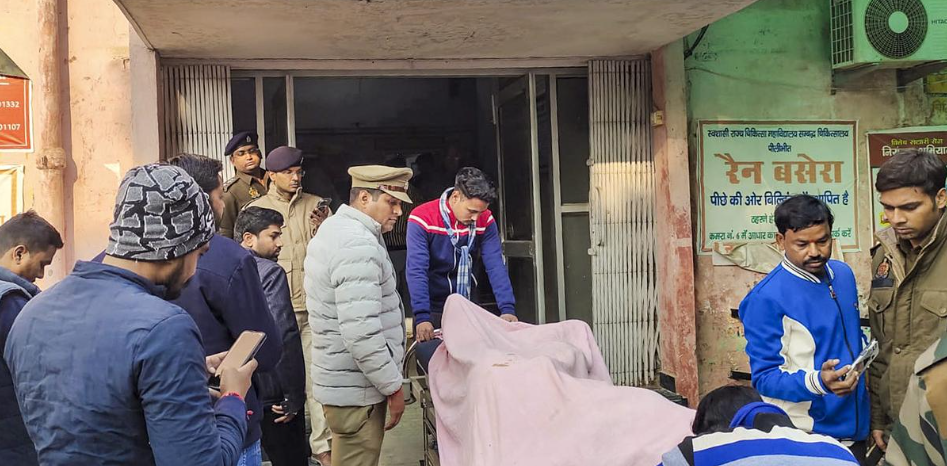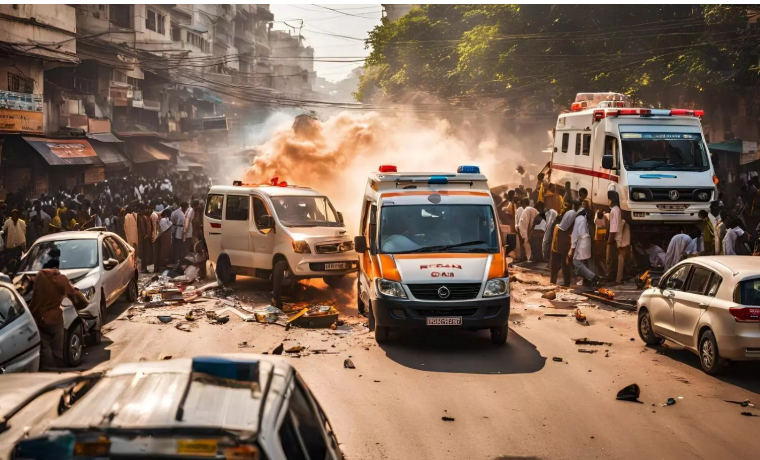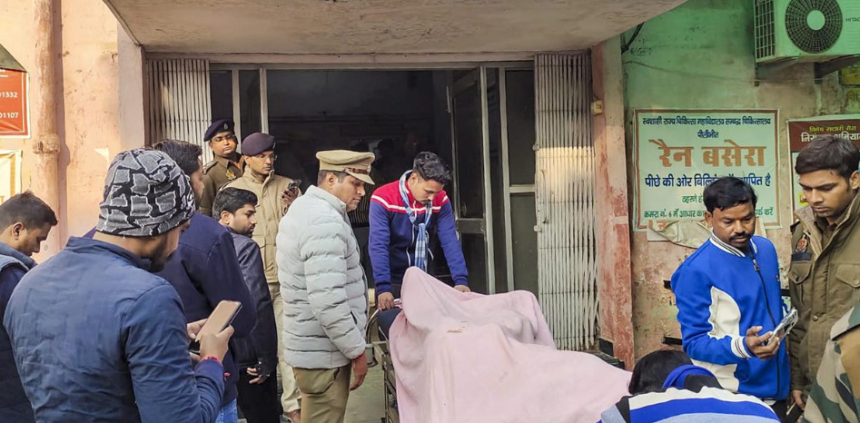Introduction
Pilibhit Encounter a dramatic turn of events following a high-profile encounter in Pilibhit’s Puranpur, an ambulance carrying the bodies of three suspected Khalistani terrorists collided with a vehicle, adding another layer of tension to an already charged situation. The joint operation, carried out by Punjab Police and Uttar Pradesh Police, neutralized the individuals allegedly involved in a recent grenade attack on a police post in Gurdaspur, Punjab.
This article provides a detailed account of the encounter, the subsequent road accident, and the broader implications of such actions in India’s ongoing fight against terrorism.
The Encounter in Pilibhit: What Happened?
The operation, a joint effort by Punjab and Uttar Pradesh Police, targeted three individuals believed to be part of a Khalistani terrorist network operating across northern India.  For the more information click on this link
For the more information click on this link
- Background of the Suspects:
- The individuals were reportedly involved in a grenade attack on a police post in Gurdaspur, which occurred a week before the encounter.
- Intelligence inputs suggested the group was planning additional attacks, posing an imminent threat to public safety and security.
- Pilibhit Operation:
- Based on intelligence regarding their location, a team of Punjab Police and UP Police intercepted the suspects in Pilibhit’s Puranpur area.
- A fierce gunfight ensued,Pilibhit Encounter with police ultimately neutralizing the three individuals. Security forces recovered weapons, ammunition, and documents linked to Khalistani outfits from the suspects’ possession.
- Successful Coordination:
- The operation is being hailed as a testament to effective inter-state coordination between Punjab and Uttar Pradesh Police in combating cross-border terrorism.
Ambulance Collision: A Shocking Development
Following the encounter, an ambulance carrying the bodies of the suspects met with an accident, sparking speculation and concern.
- Details of the Collision:
- The ambulance, transporting the bodies to a nearby hospital for autopsy, Pilibhit Encounter was struck by another vehicle. The cause of the accident remains under investigation.
- Police have confirmed that while the accident caused property damage, there were no fatalities or injuries among emergency personnel.
- Public Speculation:
- News of the accident has led to various theories, with some questioning whether it was a coincidence or a deliberate act. Authorities, however, have emphasized that preliminary investigations suggest no foul play.
Understanding the Khalistani Threat
The resurgence of Khalistani activity has been a significant security concern in India, Pilibhit Encounter particularly in Punjab, which has a historical connection to the Khalistan separatist movement.
- Historical Background:
- The Khalistani movement gained momentum in the 1980s, advocating for an independent Sikh state. It led to a period of insurgency marked by violence and political unrest in Punjab.
- Security forces successfully suppressed the movement, Pilibhit Encounter but remnants have continued to operate, both domestically and internationally.
- Contemporary Activity:
- Khalistani groups have leveraged modern communication tools and foreign sympathizers to reignite their agenda.
- Recent attacks, such as the Gurdaspur police post grenade incident, Pilibhit Encounter indicate an uptick in their activities.
- Government Response:
- Indian security agencies are prioritizing intelligence-based operations and international collaborations to neutralize Khalistani networks.
Police Achievements in the Pilibhit Encounter
The joint police operation in Pilibhit is being lauded for its swift action and effectiveness in neutralizing a potential threat.
- Coordination and Execution:
- The Punjab and Uttar Pradesh Police demonstrated excellent inter-state collaboration in tracking and intercepting the suspects.
- Key Seizures:
- The recovered cache included firearms, grenades, Pilibhit Encounter and documents that provided critical information about the suspects’ intentions and affiliations.
- Preventing Future Attacks:
- By neutralizing these individuals, the police likely averted additional terrorist attacks, Pilibhit Encounter safeguarding public safety in the region.
Public and Political Reactions
The encounter and subsequent ambulance collision have elicited mixed reactions from the public, political leaders, and security analysts.
- Government’s Position:
- Both Punjab and Uttar Pradesh governments have praised the operation, reiterating their commitment to eradicating terrorism.
- The UP Chief Minister’s Office issued a statement recognizing the efforts of law enforcement personnel involved in the operation.
- Public Sentiment:
- Many citizens have expressed relief over the successful operation but have also called for greater vigilance against recurring threats from extremist groups.
- Criticism and Concerns:
- A section of activists has raised concerns about human rights violations during such encounters, demanding transparency and judicial scrutiny.
Legal and Policy Implications
The Pilibhit operation and its aftermath bring several key issues to light, particularly in terms of counter-terrorism policies and operational transparency.
- Legal Scrutiny:
- As with any encounter, Pilibhit Encounter questions surrounding the proportionality of force and due process will need to be addressed to maintain public trust.
- Counter-Terrorism Framework:
- The encounter highlights the need for robust frameworks that prioritize intelligence sharing, preventive measures, and coordination among states.
- Strengthening Legal Provisions:
- Efforts to amend or reinforce anti-terrorism laws may emerge as a policy response to counter the evolving tactics of extremist groups.
Challenges in Countering Cross-Border Terrorism
Khalistani movements often receive external support, complicating India’s efforts to address this issue.
- Foreign Funding and Support:
- Many Khalistani groups receive logistical and financial backing from sympathizers abroad, Pilibhit Encounter particularly in countries like Canada, the UK, and the USA.
- Indian diplomatic missions have consistently sought international cooperation to curb these networks.
- Porous Borders:
- The proximity of Punjab to the India-Pakistan border presents logistical challenges, with extremists using cross-border routes to smuggle arms and operatives.
- Cyber Coordination:
- Terrorist networks increasingly utilize digital platforms to disseminate propaganda and recruit followers, requiring advanced cyber-security measures.
 For the more information click on this link
For the more information click on this link
- Terrorist networks increasingly utilize digital platforms to disseminate propaganda and recruit followers, requiring advanced cyber-security measures.
Way Forward
As India grapples with the resurgence of Khalistani elements, aPilibhit Encounter multi-pronged strategy is necessary to address the root causes of such extremism.
Key Measures:
- Enhanced Intelligence and Coordination:
- Strengthening cooperation among state and central intelligence agencies is critical to detecting threats early.
- Community Engagement:
- Promoting harmony and inclusivity can help counter extremist narratives and prevent the radicalization of vulnerable individuals.
- International Collaboration:
- Diplomatic engagements and treaties to counter terror financing and propaganda are vital to isolating groups operating abroad.
Conclusion
The Pilibhit encounter has reaffirmed the vigilance and preparedness of Indian security forces in dealing with rising threats from extremist groups. While the operation successfully neutralized a serious danger, Pilibhit Encounter the subsequent ambulance collision adds an unexpected dimension, requiring further investigation to alleviate public concerns.
As India continues its fight against terrorism, the episode highlights both the progress made and the challenges that lie ahead. The government’s commitment to safeguarding its citizens and eradicating extremism remains crucial to ensuring peace and security in the nation. ALSO READ:-Vinod Kambli Hospitalized for Urinary Tract Infection: Condition Stable, Rs 5 Lakh Aid Pledged by MP Shrikant Shinde 2024





